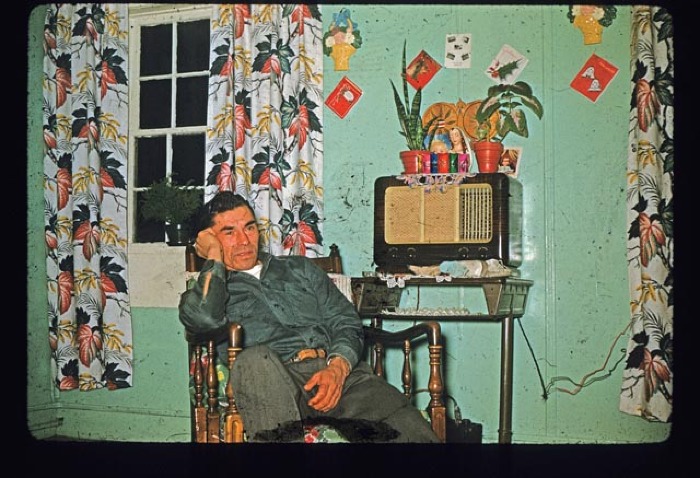Radio — Riitiuq
Riitiuq ikir'sgu. – Turn on the radio.

Photo: Karluk man relaxes by the radio, ca. 1950, Clyda Christiansen Collection, AM680
Look closely at photos of Alutiiq homes from the 1950s and 1960s and you will often see a large, prominently displayed radio receiver. The radio was an important source of entertainment and connection for rural communities in the middle 20th century. Villagers enjoyed listening to music and news. Many people taught themselves to play popular tunes on the guitar, banjo, or accordion by listening to the radio and enjoyed socializing around broadcasts. Families played card games and Monopoly while listening to shows like The Lone Ranger or People are Funny. However, you had to own a radio, have electricity to power your receiver, and the ability to tune into an Anchorage station. Not every household could listen.
In addition to radio receivers, many people used CB radio. Before the availability of telephones, CBs helped fishing boats communicate with people on shore, families at fish camp talk to relatives at home, and schools and health aides communicate with town. Elders even remember calling up friends over the CB to invite them to play.
The Alutiiq word radio, Riitiuq, comes directly from English. It is an English term modified to match the rules of Alutiiq speech. The -uq at the end of Riitiuq indicates that the word is a noun, as most singular Alutiiq words end in a q.
In addition to radio receivers, many people used CB radio. Before the availability of telephones, CBs helped fishing boats communicate with people on shore, families at fish camp talk to relatives at home, and schools and health aides communicate with town. Elders even remember calling up friends over the CB to invite them to play.
The Alutiiq word radio, Riitiuq, comes directly from English. It is an English term modified to match the rules of Alutiiq speech. The -uq at the end of Riitiuq indicates that the word is a noun, as most singular Alutiiq words end in a q.
